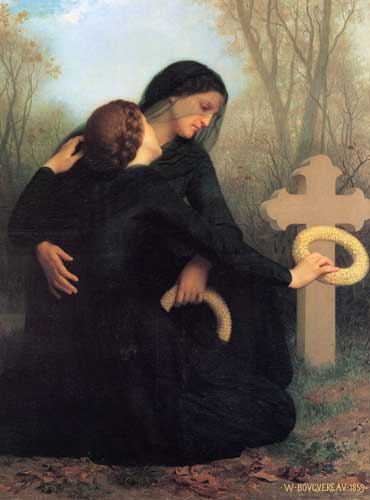The Commemoration of All the Faithful Departed
November 2nd, 2022 – Wis 3:1-9, Ps 23:1-3A, 3B-4, 5, 6, Rom 5:5-11, Jn 6:37-40
Yesterday we celebrated the Solemnity of all Saints, and as Saint Bernard of Clairvaux wrote, that feast is really for all of us, since the saints enjoy the beatific vision and are perfectly happy. Today, though, we celebrate the commemoration of all the faithful departed, and this celebration is of benefit for those who have died. One of the corporeal works of mercy is to bury the dead, and we can do this by praying for them, covering them, we could say, with our prayers. Yet, this celebration is also good for us as well, and for two reasons: first, because it reminds us that we can help our deceased loved ones, that we aren’t powerless in the face of death, and secondly, because it makes us reflect both on death and on our relationship with God.
First, because death is so final and arrives on God’s time, we often feel powerless when confronted with it. Yet, today we are reminded of the power of prayer, and that, as Aloysius Gonzaga wrote to his mother, “our parting will not be for long; we will see each other again in heaven; we shall be united with our Savior; there we shall praise Him with heart and soul, sing of His mercies forever, and enjoy eternal happiness. When He takes away what He once lent us, His purpose is to store our treasure elsewhere more safely and bestow on us those very blessings that we ourselves would most choose to have.”[1] Do we really believe Christ’s words, that those who believe in Him will never die?
Secondly, this feast gives us an opportunity to mediate on our own death and our relationship with God. Death is certain to come, but, if we find that this thought worries us or makes us anxious, it’s worthwhile to reflect on the way we’re living, and on the understanding we have of God. What would make us afraid of seeing Him? On the contrary, this thought should fill us with hope: when Saint Therese of Lisieux first realized she was sick with tuberculosis, she called that moment the “first call” of Jesus and wrote “It was like a sweet and distant murmur announcing the arrival of the Bridegroom.” The first sign of the illness that would kill her “was like a sweet and distant murmur announcing the arrival of the Bridegroom.” Likewise, Saint Alphonsus Ligouri recounts the story of a hunter who heard the sweet singing of a man’s voice in the woods. When he sought out the singer, he was surprised to find a leper, terribly disfigured and almost dead. The hunter asked him how he could sing since he was so close to death, and the leper replied, “Friend, my poor body is a crumbling wall and it is the only thing that separates me from my God. When it falls I shall go forth to God. Time for me is indeed fast running out, so every day I show my happiness by lifting my voice in song.”[2] It’s worth recalling that Saint Joseph died in the presence of the Blessed Virgin Mary and Christ Himself, and, although Christ raised many from the dead, He didn’t raise His own foster father. This can only mean that where Joseph went was far better than the world he left behind, and this just man lived in life with Jesus and Mary. “What an honor, what happiness,” writes Saint Cyprian, “in one moment to close the eyes that looked on the world of men and in the next to open them at once to look on God and Christ!”[3] Do we really believe in this joy? Or does something worry us about death? Can we say, with Saint Braulio, “O death! You separate those who are joined to each other in marriage. You harshly and cruelly divide those whom friendship unites. But your power is broken. Your heinous yoke has been destroyed by the One who sternly threatened you when Hosea cried out: O Death! I shall be your death.” Today let us pray, through the intercession of Mary, Queen of Heaven and Earth, for the grace that our deceased loved ones might enter heaven soon, and that we might not fear death, but look forward to meeting our Lord and Savior face-to-face.
[1] Saint Aloysius Gonzaga, Letter to his mother.
[2] Uniformity with God’s Will, 23.
[3] Treatise to Fortunatus, 13 (Cf. Office of Readings for Saint Callistus I, October 14th).






